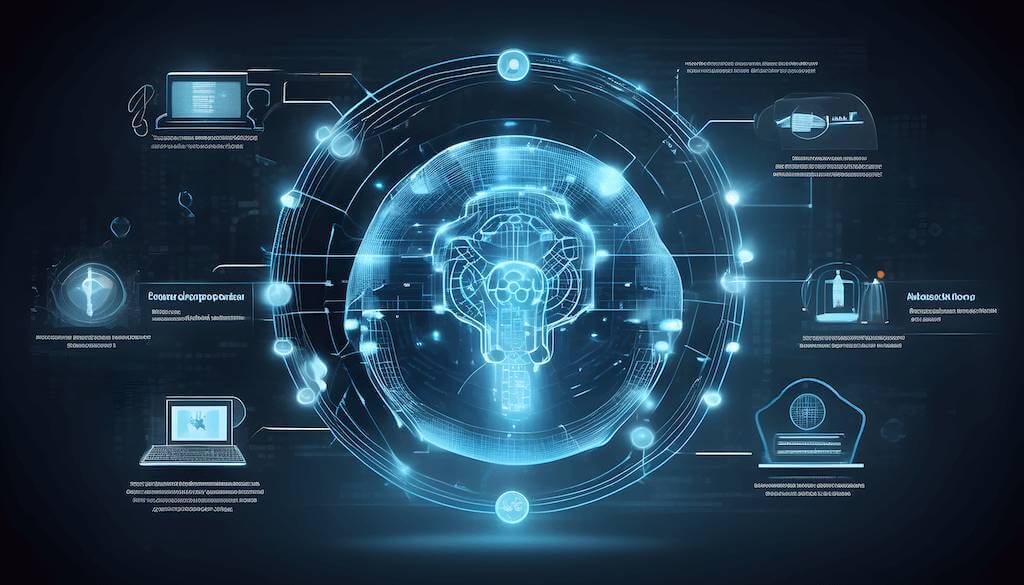Discover the historical evolution of OpenAI and its groundbreaking contributions to AI research. From founding to partnerships, explore their advancements in reinforcement learning, unsupervised learning, language models, and more. OpenAI’s mission: responsible and beneficial AI development.
In this article, you will explore the captivating journey of OpenAI, a prominent organization at the forefront of artificial intelligence research. From its early beginnings to its current groundbreaking advancements, we will delve into the historical evolution of OpenAI and shed light on its significant contributions to the world of AI. Brace yourself for a captivating exploration of the forefront of technological innovation and the remarkable achievements that OpenAI has achieved along its path.
Founding of OpenAI
Creation of OpenAI
OpenAI, short for Open Artificial Intelligence, was founded in December 2015 by a group of tech visionaries and entrepreneurs. It originated from the shared concern about the implications of artificial general intelligence (AGI) and the desire to ensure its development and deployment benefits all of humanity. The organization was created as a nonprofit with a mission to ensure that AGI is developed in a safe, ethical, and beneficial manner.
Initial goals and vision
From its inception, OpenAI aimed to build safe and advanced AI technologies while ensuring that its benefits reach all of humanity. The organization’s primary goal was to directly build safe and beneficial AGI. However, if another project aligned with their safety-conscious principles came close to building AGI before OpenAI, they committed to stop competing and start assisting that project to avoid any race without adequate safety measures.
OpenAI’s vision encompassed a long-term perspective, concentrating on conducting research to make fundamental advancements in AI and share knowledge with the global community. They believed that collaboration, safety, and ethical considerations should underpin the development and deployment of powerful AI systems.
OpenAI’s Early Research Areas
Exploration of reinforcement learning
Early on, OpenAI recognized the potential of reinforcement learning (RL) as a promising approach to AI development. RL involves training AI agents to make decisions by learning from feedback through interacting with an environment. OpenAI invested significant resources in exploring RL algorithms, techniques, and applications.
Investigations into unsupervised learning
Unsupervised learning, which involves training AI models on unlabeled data, was another area of interest for OpenAI. They saw the potential of unsupervised learning to allow AI systems to learn patterns and structures in vast amounts of data without relying on explicit labels, paving the way for more flexible and adaptable AI capabilities.
Focus on deep learning
Deep learning, a subset of machine learning based on artificial neural networks, became a primary focus for OpenAI. Known for its ability to learn hierarchical representations of data, deep learning showed promise in solving complex tasks across various domains. OpenAI dedicated efforts to push the boundaries of deep learning methodologies and applications in pursuit of their mission.
Advancements in Reinforcement Learning
Introduction of DQN algorithm
One of OpenAI’s notable contributions to reinforcement learning was the introduction of the Deep Q-Network (DQN) algorithm. DQN combined deep learning and RL to tackle complex tasks, demonstrating remarkable performance in playing Atari 2600 games. This breakthrough showcased the potential of RL in solving diverse real-world challenges.
Breakthrough with AlphaGo
OpenAI further cemented its position as a leader in RL through its involvement in the breakthrough of AlphaGo, developed by DeepMind. AlphaGo stunned the world in 2016 by defeating the world champion Go player, Lee Sedol. The techniques employed in training AlphaGo combined deep learning with RL, marking a significant milestone in AI capabilities.
Creation of OpenAI Five
OpenAI Five, a team of AI-controlled agents, marked another milestone in the organization’s advancements in RL. OpenAI Five showcased impressive cooperative gameplay in the popular online game Dota 2, competing against professional human players. This achievement demonstrated the potential of AI systems to work collaboratively and adapt to complex and dynamic environments.
Pioneering Unsupervised Learning
Development of Variational Autoencoders (VAEs)
OpenAI made significant contributions to unsupervised learning with the development of Variational Autoencoders (VAEs). VAEs are deep generative models capable of learning representations of data while enabling generation of new samples from the learned distribution. The application of VAEs found success in various domains, including image and speech generation.
Breakthroughs in Generative Adversarial Networks (GANs)
OpenAI also pushed the boundaries of unsupervised learning through its exploration of Generative Adversarial Networks (GANs). GANs present a framework for training generative models by pitting a generator network against a discriminator network. OpenAI’s research in GANs contributed to advancements in several areas, including image synthesis, data augmentation, and anomaly detection.
Exploration of self-supervised learning
OpenAI delved into the realm of self-supervised learning, an approach where AI models learn from available data without human-labeled annotations. By leveraging the inherent structure and information present in the data itself, OpenAI’s research in self-supervised learning has led to significant breakthroughs, making AI systems more capable of learning from large-scale, raw, and uncurated datasets.
Promoting Open Source and Sharing Knowledge
Open sourcing of OpenAI Gym
OpenAI has been a strong advocate of open-source software and promoting the sharing of knowledge. One of their notable contributions was the release of OpenAI Gym, an open-source platform for developing and comparing reinforcement learning algorithms. OpenAI Gym provides a standardized environment for researchers and practitioners to benchmark their RL approaches and collaborate on new developments.
Introduction of OpenAI Baselines
To further support the research community, OpenAI introduced OpenAI Baselines, a collection of high-quality reference implementations of RL algorithms. OpenAI Baselines serves as a valuable resource for researchers, enabling them to replicate and build upon established RL methodologies, accelerating the progress of RL research and development.
Release of research papers and datasets
OpenAI has consistently embraced transparency and knowledge-sharing by releasing research papers and datasets. By openly sharing their findings and data, OpenAI fosters collaboration and encourages the development of novel approaches and applications. These publications contribute to the collective understanding of AI and inspire future research endeavors.
Ethical Considerations and AI Safety
Initiation of AI safety research
Understanding the potential risks associated with AGI, OpenAI initiated rigorous research in AI safety. They acknowledged the need to develop AI systems that are robust, reliable, and aligned with human values while mitigating potential risks. OpenAI’s commitment to safety research reflects their dedication to avoid and minimize unintended negative consequences of AI technology.
Creation of the AI Alignment Newsletter
To facilitate open dialogue and engage the wider community in AI safety concerns, OpenAI established the AI Alignment Newsletter. The newsletter, published regularly, serves as a platform for discussing research, ideas, and challenges related to aligning AI systems with human values. This initiative showcases OpenAI’s commitment to transparently sharing insights and fostering collaboration in the pursuit of safe AI.
Introduction of reinforcement learning with human feedback
OpenAI recognized the importance of including human expertise and feedback in AI systems’ training process. Through the development of reinforcement learning with human feedback (RLHF), OpenAI explored techniques to incorporate human evaluators into the RL loop. This approach aimed to combine the unique strengths of human intelligence and machine learning, enhancing the safety and performance of AI technology.
Towards Generality and Benchmarking
Development of OpenAI Retro
OpenAI Retro, an extension of OpenAI Gym, focuses on advancing research in generalization and transfer learning. Retro provides a platform for training AI agents to learn from retroactive video game environments, enabling the evaluation and development of algorithms that can generalize knowledge across different tasks and domains.
Introduction of OpenAI Gym Retro Contest
To encourage participation and foster innovation, OpenAI launched the OpenAI Gym Retro Contest. The contest challenges researchers and enthusiasts to develop AI agents with generalization and adaptation capabilities using Retro’s collection of retroactive video game environments. The contest incentivizes the development of AI systems capable of learning across diverse scenarios, pushing the boundaries of AGI.
Push for benchmarking and standardization
OpenAI has been a driving force in advocating for benchmarking and standardization in AI research. They emphasize the importance of fair and consistent evaluation frameworks to measure and compare the progress of AI models. By promoting benchmarking and standardization, OpenAI aims to ensure the development of robust and reliable AI technologies.
Exploring Language and NLP
Creation of the GPT series
OpenAI made significant contributions to natural language processing (NLP) with the creation of the groundbreaking Generative Pre-trained Transformer (GPT) series. GPT leverages the power of deep learning and transformer architectures to generate coherent and contextually relevant human-like text. The GPT series has revolutionized language generation and understanding tasks, advancing the capabilities of AI in communication and information processing.
Advancements in natural language understanding
OpenAI invested resources in advancing the field of natural language understanding (NLU), with a focus on developing models capable of comprehending and generating human language. Their research in NLU enables AI systems to interpret and respond to natural language queries, facilitating more intuitive human-AI interactions and contributing to applications like search engines, chatbots, and AI assistants.
Investigations into chatbots and AI assistants
OpenAI explored the potential of chatbots and AI assistants as tools for enhancing human productivity and efficiency. Through research and development, OpenAI developed AI models capable of engaging in meaningful and contextually relevant conversations with users. Their work in this area aims to create AI systems that can assist with a wide range of tasks, from answering questions to providing intelligent recommendations.
Collaborations, Partnerships, and Mergers
Partnerships with other research institutions
OpenAI actively collaborates with other research institutions and academic organizations to foster knowledge exchange and advance AI research. These partnerships enable researchers to work together on cutting-edge projects, share resources, and leverage expertise in interdisciplinary fields, fostering innovation and pushing the boundaries of AI capabilities.
Collaborative projects with industry leaders
Acknowledging the importance of collaboration between academia and industry, OpenAI partners with industry leaders to bridge the gap between research and real-world applications. Collaborative projects with companies from various sectors enable OpenAI to gain insights from industry expertise while sharing their research findings to drive advancements in AI technology across sectors.
Mergers with other AI organizations
In pursuit of its mission, OpenAI has engaged in mergers with other AI organizations. These mergers have allowed OpenAI to pool resources, talent, and expertise, amplifying their capabilities and accelerating the development of safe and beneficial AI systems. By joining forces with like-minded organizations, OpenAI strengthens its position in the AI community and broadens its potential impact.
Future Directions and OpenAI’s Mission
Expansion of research domains
OpenAI plans to expand its research into new domains beyond the current focus areas. By branching into diverse fields, such as robotics, healthcare, and climate change, OpenAI aims to develop AI systems that address pressing global challenges, with a strong emphasis on safety, fairness, and usefulness.
Focus on safety, ethical considerations, and responsible AI
As AI technology continues to advance, safety and ethical considerations remain at the forefront of OpenAI’s mission. OpenAI will continue to prioritize the development of AI that minimizes risks and ensures alignment with human values. They strive to establish responsible AI practices, advocating for transparency, accountability, and the avoidance of biases in AI systems.
Integration of AI technology into different industries
OpenAI envisions a future where AI technology is seamlessly integrated into various industries, improving efficiency, productivity, and quality of life. By collaborating with industry partners, OpenAI intends to develop AI systems tailored to specific sectors, unlocking new possibilities and fostering positive transformations across industries.
In conclusion, OpenAI’s journey from its founding to its current endeavors showcases the organization’s significant contributions to AI research and the broader AI community. Through groundbreaking advancements in reinforcement learning, unsupervised learning, language models, and partnerships with industry leaders, OpenAI has made immense strides in shaping the field of AI. As it moves forward, OpenAI remains committed to ensuring the responsible and beneficial development of AI technology, with a strong emphasis on safety, ethical considerations, and collaboration with the global community.


